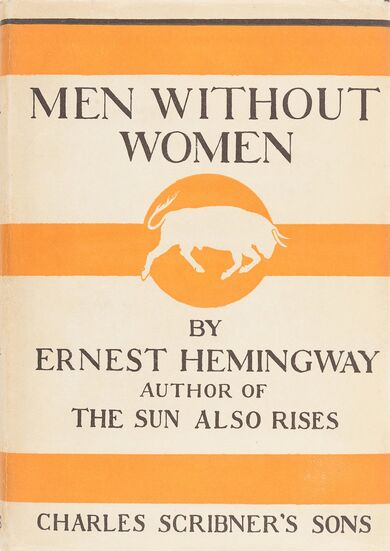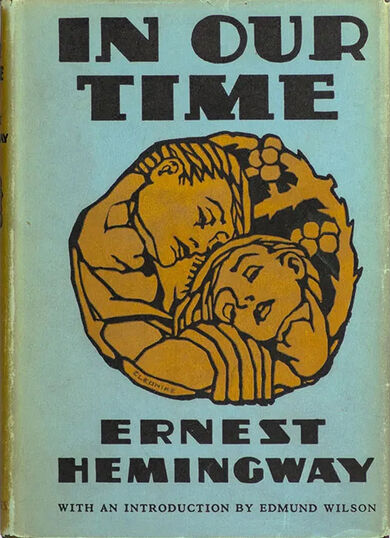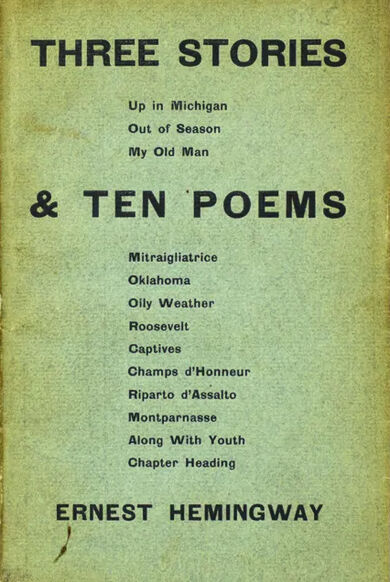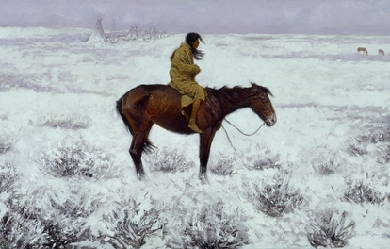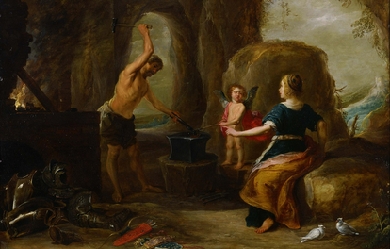The road of the pass was hard and smooth and not yet dusty in the early morning. Below were the hills with oak and chestnut trees, and far away below was the sea. On the other side were snowy mountains.
We came down from the pass through wooded country. There were bags of charcoal piled beside the road, and through the trees we saw charcoal-burners’ huts. It was Sunday and the road, rising and falling, but always dropping away from the altitude of the pass, went through the scrub woods and through villages.
Outside the villages there were fields with vines. The fields were brown and the vines coarse and thick. The houses were white, and in the streets the men, in their Sunday clothes, were playing bowls. Against the walls of some of the houses there were pear trees, their branches candelabraed against the white walls. The pear trees had been sprayed, and the walls of the houses were stained a metallic blue-green by the spray vapor. There were small clearings around the villages where the vines grew, and then the woods.
In a village, twenty kilometres above Spezia, there was a crowd in the square, and a young man carrying a suitcase came up to the car and asked us to take him in to Spezia.
“There are only two places, and they are occupied,” I said. We had an old Ford coupé.
“I will ride on the outside.”
“You will be uncomfortable.”
“That makes nothing. I must go to Spezia.”
“Should we take him?” I asked Guy.
“He seems to be going anyway,” Guy said. The young man handed in a parcel through the window.
“Look after this,” he said. Two men tied his suitcase on the back of the car, above our suitcases. He shook hands with every one, explained that to a Fascist and a man as used to travelling as himself there was no discomfort, and climbed up on the running-board on the left-hand side of the car, holding on inside, his right arm through the open window.
“You can start,” he said. The crowd waved. He waved with his free hand.
“What did he say?” Guy asked me.
“That we could start.”
“Isn’t he nice?” Guy said.
The road followed a river. Across the river were mountains. The sun was taking the frost out of the grass. It was bright and cold and the air came cold through the open wind-shield.
“How do you think he likes it out there?” Guy was looking up the road. His view out of his side of the car was blocked by our guest. The young man projected from the side of the car like the figurehead of a ship. He had turned his coat collar up and pulled his hat down and his nose looked cold in the wind.
“Maybe he’ll get enough of it,” Guy said. “That’s the side our bum tire’s on.”
“Oh, he’d leave us if we blew out,” I said. “He wouldn’t get his travelling-clothes dirty.”
“Well, I don’t mind him,” Guy said—“except the way he leans out on the turns.”
The woods were gone; the road had left the river to climb; the radiator was boiling; the young man looked annoyedly and suspiciously at the steam and rusty water; the engine was grinding, with both Guy’s feet on the first-speed pedal, up and up, back and forth and up, and, finally, out level. The grinding stopped, and in the new quiet there was a great churning bubbling in the radiator. We were at the top of the last range above Spezia and the sea. The road descended with short, barely rounded turns. Our guest hung out on the turns and nearly pulled the top-heavy car over.
“You can’t tell him not to,” I said to Guy. “It’s his sense of self-preservation.”
“The great Italian sense.”
“The greatest Italian sense.”
We came down around curves, through deep dust, the dust powdering the olive trees. Spezia spread below along the sea. The road flattened outside the town. Our guest put his head in the window.
“I want to stop.”
“Stop it,” I said to Guy.
We slowed up, at the side of the road. The young man got down, went to the back of the car and untied the suitcase.
“I stop here, so you won’t get into trouble carrying passengers,” he said. “My package.”
I handed him the package. He reached in his pocket.
“How much do I owe you?”
“Nothing.”
“Why not?”
“I don’t know,” I said.
“Then thanks,” the young man said, not “thank you,” or “thank you very much,” or “thank you a thousand times,” all of which you formerly said in Italy to a man when he handed you a time-table or explained about a direction. The young man uttered the lowest form of the word “thanks” and looked after us suspiciously as Guy started the car. I waved my hand at him. He was too dignified to reply. We went on into Spezia.
“That’s a young man that will go a long way in Italy,” I said to Guy.
“Well,” said Guy, “he went twenty kilometres with us.”
A Meal In Spezia
We came into Spezia looking for a place to eat. The street was wide and the houses high and yellow. We followed the tram-track into the centre of town. On the walls of the houses were stencilled eye-bugging portraits of Mussolini, with hand-painted “vivas,” the double V in black paint with drippings of paint down the wall. Side-streets went down to the harbor. It was bright and the people were all out for Sunday. The stone paving had been sprinkled and there were damp stretches in the dust. We went close to the curb to avoid a tram.
“Let’s eat somewhere simple,” Guy said.
We stopped opposite two restaurant signs. We were standing across the street and I was buying the papers. The two restaurants were side by side. A woman standing in the doorway of one smiled at us and we crossed the street and went in.
It was dark inside and at the back of the room three girls were sitting at a table with an old woman. Across from us, at another table, sat a sailor. He sat there neither eating nor drinking. Further back, a young man in a blue suit was writing at a table. His hair was pomaded and shining and he was very smartly dressed and clean-cut looking.
The light came through the doorway, and through the window where vegetables, fruit, steaks, and chops were arranged in a show-case. A girl came and took our order and another girl stood in the doorway. We noticed that she wore nothing under her house dress. The girl who took our order put her arm around Guy’s neck while we were looking at the menu. There were three girls in all, and they all took turns going and standing in the doorway. The old woman at the table in the back of the room spoke to them and they sat down again with her.
There was no doorway leading from the room except into the kitchen. A curtain hung over it. The girl who had taken our order came in from the kitchen with spaghetti. She put it on the table and brought a bottle of red wine and sat down at the table.
“Well,” I said to Guy, “you wanted to eat some place simple.”
“This isn’t simple. This is complicated.”
“What do you say?” asked the girl. “Are you Germans?”
“South Germans,” I said. “The South Germans are a gentle, lovable people.”
“Don’t understand,” she said.
“What’s the mechanics of this place?” Guy asked. “Do I have to let her put her arm around my neck?”
“Certainly,” I said. “Mussolini has abolished the brothels. This is a restaurant.”
The girl wore a one-piece dress. She leaned forward against the table and put her hands on her breasts and smiled. She smiled better on one side than on the other and turned the good side toward us. The charm of the good side had been enhanced by some event which had smoothed the other side of her nose in, as warm wax can be smoothed. Her nose, however, did not look like warm wax. It was very cold and firmed, only smoothed in. “You like me?” she asked Guy.
“He adores you,” I said. “But he doesn’t speak Italian.”
“Ich spreche Deutsch,” she said, and stroked Guy’s hair.
“Speak to the lady in your native tongue, Guy.”
“Where do you come from?” asked the lady.
“Potsdam.”
“And you will stay here now for a little while?”
“In this so dear Spezia?” I asked.
“Tell her we have to go,” said Guy. “Tell her we are very ill, and have no money.”
“My friend is a misogynist,” I said, “an old German misogynist.”
“Tell him I love him.”
I told him.
“Will you shut your mouth and get us out of here?” Guy said. The lady had placed another arm around his neck. “Tell him he is mine,” she said. I told him.
“Will you get us out of here?”
“You are quarrelling,” the lady said. “You do not love one another.”
“We are Germans,” I said proudly, “old South Germans.”
“Tell him he is a beautiful boy,” the lady said. Guy is thirty-eight and takes some pride in the fact that he is taken for a travelling salesman in France. “You are a beautiful boy,” I said.
“Who says so?” Guy asked, “you or her?”
“She does. I’m just your interpreter. Isn’t that what you got me in on this trip for?”
“I’m glad it’s her,” said Guy. “I didn’t want to have to leave you here too.”
“I don’t know. Spezia’s a lovely place.”
“Spezia,” the lady said. “You are talking about Spezia.”
“Lovely place,” I said.
“It is my country,” she said. “Spezia is my home and Italy is my country.”
“She says that Italy is her country.”
“Tell her it looks like her country,” Guy said.
“What have you for dessert?” I asked.
“Fruit,” she said. “We have bananas.”
“Bananas are all right,” Guy said. “They’ve got skins on.”
“Oh, he takes bananas,” the lady said. She embraced Guy.
“What does she say?” he asked, keeping his face out of the way.
“She is pleased because you take bananas.”
“Tell her I don’t take bananas.”
“The Signor does not take bananas.”
“Ah,” said the lady, crestfallen, “he doesn’t take bananas.”
“Tell her I take a cold bath every morning,” Guy said.
“The Signor takes a cold bath every morning.”
“No understand,” the lady said.
Across from us, the property sailor had not moved. No one in the place paid any attention to him.
“We want the bill,” I said.
“Oh, no. You must stay.”
“Listen,” the clean-cut young man said from the table where he was writing, “let them go. These two are worth nothing.”
The lady took my hand. “You won’t stay? You won’t ask him to stay?”
“We have to go,” I said. “We have to get to Pisa, or if possible, Firenze, to-night. We can amuse ourselves in those cities at the end of the day. It is now the day. In the day we must cover distance.”
“To stay a little while is nice.”
“To travel is necessary during the light of day.”
“Listen,” the clean-cut young man said. “Don’t bother to talk with these two. I tell you they are worth nothing and I know.”
“Bring us the bill,” I said. She brought the bill from the old woman and went back and sat at the table. Another girl came in from the kitchen. She walked the length of the room and stood in the doorway.
“Don’t bother with these two,” the clean-cut young man said in a wearied voice.
“Come and eat. They are worth nothing.”
We paid the bill and stood up. All the girls, the old woman, and the clean-cut young man sat down at table together. The property sailor sat with his head in his hands. No one had spoken to him all the time we were at lunch. The girl brought us our change that the old woman counted out for her and went back to her place at the table. We left a tip on the table and went out. When we were seated in the car ready to start, the girl came out and stood in the door. We started and I waved to her. She did not wave, but stood there looking after us.
After The Rain
It was raining hard when we passed through the suburbs of Genoa and, even going very slowly behind the tram-cars and the motor trucks, liquid mud splashed on to the sidewalks, so that people stepped into doorways as they saw us coming. In San Pier d’Arena, the industrial suburb outside of Genoa, there is a wide street with two car-tracks and we drove down the centre to avoid sending the mud on to the men going home from work. On our left was the Mediterranean. There was a big sea running and waves broke and the wind blew the spray against the car. A river-bed that, when we had passed, going into Italy, had been wide, stony and dry, was running brown, and up to the banks. The brown water discolored the sea and as the waves thinned and cleared in breaking, the light came through the yellow water and the crests, detached by the wind, blew across the road.
A big car passed us, going fast, and a sheet of muddy water rose up and over our wind-shield and radiator. The automatic wind-shield cleaner moved back and forth, spreading the film over the glass. We stopped and ate lunch at Sestri. There was no heat in the restaurant and we kept our hats and coats on. We could see the car outside, through the window. It was covered with mud and was stopped beside some boats that had been pulled up beyond the waves. In the restaurant you could see your breath.
The pasta asciuta was good; the wine tasted of alum, and we poured water in it. Afterward the waiter brought beefsteak and fried potatoes. A man and a woman sat at the far end of the restaurant. He was middle-aged and she was young and wore black. All during the meal she would blow out her breath in the cold damp air. The man would look at it and shake his head. They ate without talking and the man held her hand under the table. She was good-looking and they seemed very sad. They had a travelling-bag with them.
We had the papers and I read the account of the Shanghai fighting aloud to Guy. After the meal, he left with the waiter in search for a place which did not exist in the restaurant, and I cleaned off the wind-shield, the lights and the license plates with a rag. Guy came back and we backed the car out and started. The waiter had taken him across the road and into an old house. The people in the house were suspicious and the waiter had remained with Guy to see nothing was stolen.
“Although I don’t know how, me not being a plumber, they expected me to steal anything,” Guy said.
As we came up on a headland beyond the town, the wind struck the car and nearly tipped it over.
“It’s good it blows us away from the sea,” Guy said.
“Well,” I said, “they drowned Shelley somewhere along here.”
“That was down by Viareggio,” Guy said. “Do you remember what we came to this country for?”
“Yes,” I said, “but we didn’t get it.”
“We’ll be out of it to-night.”
“If we can get past Ventimiglia.”
“We’ll see. I don’t like to drive this coast at night.” It was early afternoon and the sun was out. Below, the sea was blue with whitecaps running toward Savona. Back, beyond the cape, the brown and blue waters joined. Out ahead of us, a tramp steamer was going up the coast.
“Can you still see Genoa?” Guy asked.
“Oh, yes.”
“That next big cape ought to put it out of sight.”
“We’ll see it a long time yet. I can still see Portofino Cape behind it.”
Finally we could not see Genoa. I looked back as we came out and there was only the sea, and below in the bay, a line of beach with fishing-boats and above, on the side of the hill, a town and then capes far down the coast.
“It’s gone now,” I said to Guy.
“Oh, it’s been gone a long time now.”
“But we couldn’t be sure till we got way out.”
There was a sign with a picture of an S-turn and Svolta Pericolosa. The road curved around the headland and the wind blew through the crack in the wind-shield. Below the cape was a flat stretch beside the sea. The wind had dried the mud and the wheels were beginning to lift dust. On the flat road we passed a Fascist riding a bicycle, a heavy revolver in a holster on his back. He held the middle of the road on his bicycle and we turned out for him. He looked up at us as we passed. Ahead there was a railway crossing, and as we came toward it the gates went down.
As we waited, the Fascist came up on his bicycle. The train went by and Guy started the engine.
“Wait,” the bicycle man shouted from behind the car. “Your number’s dirty.”
I got out with a rag. The number had been cleaned at lunch.
“You can read it,” I said.
“You think so?”
“Read it.”
“I cannot read it. It is dirty.”
I wiped it off with the rag.
“How’s that?”
“Twenty-five lire.”
“What?” I said. “You could have read it. It’s only dirty from the state of the roads.”
“You don’t like Italian roads?”
“They are dirty.”
“Fifty lire.” He spat in the road. “Your car is dirty and you are dirty too.”
“Good. And give me a receipt with your name.”
He took out a receipt-book, made in duplicate, and perforated, so one side could be given to the customer, and the other side filled in and kept as a stub. There was no carbon to record what the customer’s ticket said.
“Give me fifty lire.”
He wrote in indelible pencil, tore out the slip and handed it to me. I read it.
“This is for twenty-five lire.”
“A mistake,” he said, and changed the twenty-five to fifty.
“And now the other side. Make it fifty in the part you keep.”
He smiled a beautiful Italian smile and wrote something on the receipt stub, holding it so I could not see.
“Go on,” he said, “before your number gets dirty again.”
We drove for two hours after it was dark and slept in Mentone that night. It seemed very cheerful and clean and sane and lovely. We had driven from Ventimiglia to Pisa and Florence, across the Romagna to Rimini, back through Forli, Imola, Bologna, Parma, Piacenza and Genoa, to Ventimiglia again. The whole trip had only taken ten days. Naturally, in such a short trip, we had no opportunity to see how things were with the country or the people.


